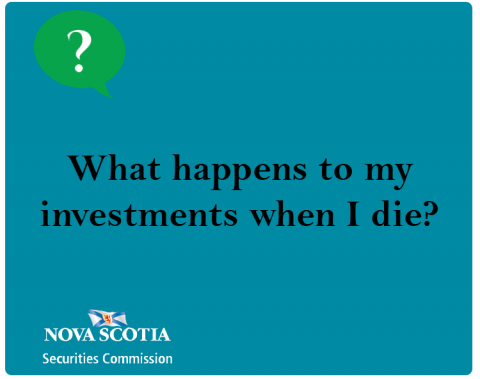Submitted by nsscadmin on

Last week we answered the question, what happens to my RRIF when I die? That led to a question of a greater scope – what happens to my investments when I die?
There’s no one size fits all answer to that question for all your investments, but we’ll try to cover as much as we can and will look at RRSP and TFSA accounts. Even after reading this post and getting the information we’ve provided, we recommend you consult a lawyer, or tax and estate planning specialist, and closely examine your will and legal documents to make sure everything is set up the way you want it to be.
Typically, when a person dies their RRSP is considered to be cashed out and the fair market value of the investments held in their RRSP are included in their income for the year. However, there are ways to pass on most of your investments without the tax man taking too big of a chunk.
First you need to designate a qualified beneficiary for your RRSP. This could include a spouse or common-law partner, or financially dependent child or grandchild.
If you have designated your spouse as your qualified beneficiary, the RRSP assets can be transferred to them. These assets can be transferred to an RRSP or RRIF to maintain their tax deferred status. They may also choose to take it out as cash, however this will result in taxes being paid.
If the qualified beneficiary is a financially dependent child or grandchild, they may transfer it to an RRSP or RRIF, or purchase an annuity that will pay them annually until they reach the age of majority,
You can also designate a non-qualified beneficiary. These can include financially independent children or grandchildren, or a charity.
A TFSA differs slightly because its contributions do not incur the same tax penalties when withdrawn. With a TFSA you can designate a successor holder or beneficiary.
The designation successor holder can only be applied to a spouse or common-law partner. They can simply take over the TFSA and become the new owner. They do not have to have TFSA contribution room available and the assets in the account are not subject to taxes.
A spouse, child or any other individual can be designated a beneficiary. In this instance the TFSA is collapsed and the value of the account will go to the beneficiary tax free. If the beneficiary wants to contribute this money to their own TFSA there are rules they must follow, so make sure you understand which rules apply to you before going forward with any transactions.
If no beneficiary is named for an RRSP or TFSA, the assets would be added to the deceased’s estate. This could have an effect on probate fees and other taxes paid by the estate.
The guidelines we have written about here can change and may vary from province to province depending upon laws within that province. Before doing anything with your money or making any decisions about your future you should contact a lawyer, estate planner or tax expert.
